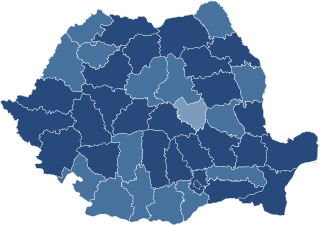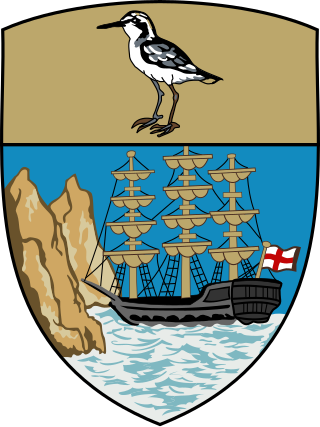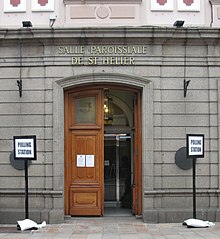The electoral system of Australia comprises the laws and processes used for the election of members of the Australian Parliament and is governed primarily by the Commonwealth Electoral Act 1918. The system presently has a number of distinctive features including compulsory enrolment; compulsory voting; majority-preferential instant-runoff voting in single-member seats to elect the lower house, the House of Representatives; and the use of the single transferable vote proportional representation system to elect the upper house, the Senate.
The alternative vote plus (AV+), or alternative vote top-up, is a semi-proportional voting system. AV+ was devised by the 1998 Jenkins Commission which first proposed the idea as a system that could be used for elections to the Parliament of the United Kingdom.
"None of the above" (NOTA), or none for short, also known as "against all" or a "scratch" vote, is a ballot option in some jurisdictions or organizations, designed to allow the voter to indicate disapproval of the candidates in a voting system. It is based on the principle that consent requires the ability to withhold consent in an election, just as they can by voting "No" on ballot questions. It must be contrasted with "abstention", in which a voter does not cast a ballot.

The North East England devolution referendum was an all postal ballot referendum that took place on 4 November 2004 throughout North East England on whether or not to establish an elected assembly for the region. Devolution referendums in the regions of Northern England were initially proposed under provisions of the Regional Assemblies (Preparations) Act 2003. Initially, three referendums were planned, but only one took place. The votes concerned the question of devolving limited political powers from the UK Parliament to elected regional assemblies in North East England, North West England and Yorkshire and the Humber respectively. Each were initially planned to be held on 4 November 2004, but on 22 July 2004 the planned referendums in North West England and in Yorkshire and the Humber were postponed, due to concerns raised about the use of postal ballots, but the referendum in North East England was allowed to continue, particularly as it was assumed that the region held the most support for the proposed devolution.

A referendum was held in the Canadian province of British Columbia on May 17, 2005, to determine whether or not to adopt the recommendation of the Citizens' Assembly on Electoral Reform to replace the existing first-past-the-post electoral system (FPTP) with a single transferable vote system (BC-STV). It was held in conjunction with the BC Legislative Assembly election of 2005. Voters were given two ballots at that time: a ballot to vote for a Member of the Legislative Assembly of British Columbia (MLA) in their constituency and a referendum ballot. The referendum received considerable support from the electorate but failed in meeting the 60-percent threshold that had been set. A second referendum was held in 2009.

Elections in Jersey take place for the States Assembly and at parish-level. Various parties have been formed over the years in Jersey, but few candidates stand for election affiliated to any political party. All elections in Jersey use the first-past-the-post voting system. In 2008, the voting age was reduced to 16 years.

The States Assembly is the parliament of Jersey, formed of the island's 37 deputies and the Connétable of each of the twelve parishes.
General elections were held in Jersey in two stages in October and November 2008.

A referendum on changing the parliamentary electoral system to a two-round system was held in Romania on 25 November 2007, on the same date as the European elections. The referendum was called by President Traian Băsescu on 23 October 2007 when the Parliament of Romania failed to meet a deadline set by him to pass these changes.
Electoral reform is a change in electoral systems which alters how public desires are expressed in election results.

The United Kingdom Alternative Vote referendum, also known as the UK-wide referendum on the Parliamentary voting system was held on Thursday 5 May 2011 in the United Kingdom (UK) to choose the method of electing MPs at subsequent general elections. It occurred as a provision of the Conservative–Liberal Democrat coalition agreement drawn up in 2010 and also indirectly in the aftermath of the 2009 expenses scandal. It operated under the provisions of the Parliamentary Voting System and Constituencies Act 2011 and was the first national referendum to be held under provisions laid out in the Political Parties, Elections and Referendums Act 2000.

Jeremy Martin Maçon is a Jersey politician who served as one of the Deputies in the St Saviour No. 1 constituency between 2008 and 2022.

Lyndon John Farnham is a Jersey politician who has served as the Chief Minister of Jersey since January 2024. He formerly served as the Deputy Chief Minister and Minister for Economic Development, Tourism, Sport, and Culture. He has been a Deputy for St Mary, St Ouen & St Peter since 2022, having previously served as a Deputy for St Saviour and later a Senator. He is a business consultant and a company director.
Reform Jersey is a centre-left social-democratic political party in Jersey. In all general elections since 2014, Reform has won the most seats of any party in the States Assembly. However, it has not won a majority of seats in any general election due to the large number of independents in the Assembly.

A referendum on electoral reform was held in Jersey on 15 October 2014, alongside general elections. Voters were asked whether elected constables should continue to automatically become members of the States. Their continued automatic membership was approved by 62% of voters.
A non-binding referendum on electoral reform was held in the Canadian province of Prince Edward Island between 27 October – 7 November 2016. This was the second electoral reform referendum to be held in Prince Edward Island, following a vote to maintain the status quo in 2005. The referendum asked which of five voting systems residents would prefer to use in electing members to the Legislative Assembly of Prince Edward Island. The referendum involved four counts under Instant-runoff voting rules and at the end, mixed member proportional representation was the majority choice with 55.03% support on the final ballot, with support of 52.42% of votes cast.

The Italian electoral law of 2017, colloquially known by the nickname Rosatellum bis or simply Rosatellum after Ettore Rosato, the Democratic Party (PD) leader in the Chamber of Deputies who first proposed the new law, is a parallel voting system, which acts as a mixed electoral system, with 37% of seats allocated using a first-past-the-post electoral system and 63% using a proportional method, with one round of voting. The Chamber and Senate of the Republic did not differ in the way they allocated the proportional seats, both using the largest remainder method of allocating seats.
A referendum on electoral reform was held on 10 October 2018 in Guernsey to determine an electoral system for elections to the States of Guernsey. Voters were asked to rank five different proposed electoral systems, with a run-off system used to determine the winning proposal. Option A, a 38-member constituency covering the whole island, won the vote. As a result of voter turnout (45%) being above the 40% vote threshold, the referendum was binding.

The 2022 Jersey general election was held on 22 June 2022 to elect Connétables and deputies to the States Assembly. As in previous elections, the majority of seats were won by independents. The governing Jersey Alliance party suffered a heavy defeat, losing all but one of its seats. Following the election, a coalition government led by Better Way Deputy Kristina Moore was formed.

A two-part consultative referendum on changing the system of governance was held in Saint Helena on 17 March 2021. In the first question, voters were asked whether there should be a change. In the second, they were asked for their preference on the form of governance, choosing between a committee system and a ministerial system.












